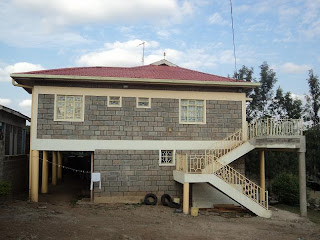Dine and I are one of the very few ‘mzungus’ in this area, which in their Kiswhahili language translates to ‘white people’. We are called this name by children, teenagers, adults, elderly people, you name it. Some children come to us on the streets to touch our skin and then run away. I think to them, who have never seen mzungus before, we look more or less like ‘aliens’. J At first, people look at us suspiciously… then, when say to them ‘habari yako’ (how are you?), they open the biggest smile and greet us back. Kenyans are very friendly people! According to our host father Wangure, the total population of white people in
The children at the orphanage may think that we look different but they are all coming to a realization that we are all equal. Frederick and I sealing our friendship at Overcomers Centre for Orphans.
 |
| Making new friends |
 |
| Rongai Market |
Shops around the main road in all areas of
 |
| Shops with great visual polution |
 |
| Advertisement Signs |
 |
| Funeral Stones for sale on the streets |
 |
| Quarry Workers |
Going back to the donkeys, the only thing that breaks my heart is to see some owners beating these hard worker animals so hard with their whips. When I see a donkey with a wound on their skin, from being severely beaten by their owners, I have to turn my face away. In saying that, our host father Wangure told us that nowadays donkeys are being beaten a lot less by their owners.
 |
| Donkey Cart |
A common feature of all the matatus is that they play songs very loudly. People don’t complain about this, they accept that ‘it is the way it is’. One cheeky matatu had a sticker saying ‘if it’s too loud, you are too old’. I’m especially fond of matatus playing mellow songs, particularly in the early mornings on our way to the orphanages. After all, no one deserves loud American rap songs first thing in the day. I think I’m getting old… J
 |
| Bus & Matatus Terminal |
 |
| Host Family House |
 |
| Host Family - Pastor Wangure, me, Violet, Vincent & Margaret |
 |
| Cute Pet Rabbit |
Kenya sounds like a very different experience from South Africa. Your blog is a great overview of your adventures.
ReplyDeleteThanks for sharing.
Keep well and safe
Sue x